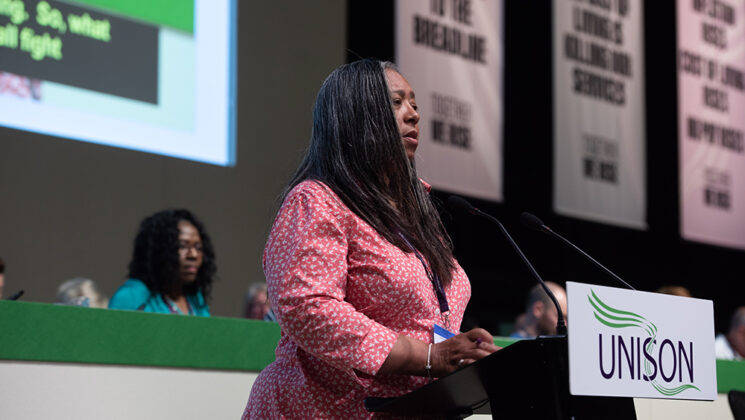Moving a motion on the future of the national minimum wage on Thursday morning, Linda Hobson of the Northern region started by looking back to the opening motion of national delegate conference on Tuesday – UNISON at 30 – and how it had looked at the union’s successes.
One of those successes, she told delegates, “must be the implementation of the national minimum wage under the last Labour government.
“Our gen sec at the time, Rodney Bickerstaffe, was absolutely pivotal.”
But now the union can “see the impact of over 10 years of Tory austerity”. Citing a member who says: ‘There’s too much of the month left at the end of my wages’ as the cost of living bites ever deeper, Ms Hobson said that it was “timely that we call for a review of the national minimum wage and the national living wage”.
She also noted that it must sit alongside a campaign for secure wage, because the level of a wage is irrelevant if a worker is only getting a few hours a week.
Theresa Robinson for the NEC described the national minimum wage as “a pittance.” Essential, minimum-wage workers were applauded during the pandemic, she said, but although the cost of living crisis it hitting everyone, it is the lowest-paid workers – many of them key workers – who are suffering the most.
She explained that, as a care worker herself, her wage doesn’t work out as the national minimum wage, as she doesn’t get paid that rate when she does sleep-ins for her job.
Doreen Davies (pictured above) for the community and voluntary service group stressed that: “We all need to be together in this”, adding that it is important to consider inflation too, “because what is happening is we’re campaigning for a raised national minimum wage, but inflation is outstripping any rise we’re campaigning for”.
The motion was carried unanimously, with delegates calling on the NEC to:
- carry out research into the strengths and weaknesses of the national minimum wage and the national living wage;
- develop policy proposals to improve how the national minimum wage and the national living wage deliver for low-paid workers;
- campaign with “like-minded unions and other campaign groups for change”.
The need for better statutory sick pay

Following that, conference tackled a composite motion on sick pay. Moving for the Ulster Community and Hospitals branch, Pam McKenzie (above) said that there was a “shocking lack of support many workers receive when they are sick”.
The rate of statutory sick pay in the UK is one of the lowest in Europe.
“Who is supposed to rely on statutory sick pay (SSP)?” she asked. “It is the lowest paid and that is mostly women.”
During the pandemic, many had to rely on SSP, causing “severe economic hardship”.
“We need to demand proper occupational sick schemes from day one,” said Ms McKenzie.
“If there’s one lesson we need to learn from the pandemic, is that we reply on workers who are undervalued and under paid.”
Richard from the private contractors’ forum asked delegates if they’ve heard – or used – the phrase: ‘I can’t afford to be off sick’. Hands were raised throughout the hall in answer to both questions.
“We need to give our members what they need and what they deserve,” he said.
Yvonne Laurenson from Camden spoke of the cleaners and care workers who were “clapped but not paid” if sick or having to shield because of COVID-19.
“Proper sick pay helps save lives,” she said – a point backed up by Andrew Berry from Islington who said: “Our members had to choose between putting food on the table and risking going to work sick”.
And he observed that care homes where staff received better sick pay had lower rates of residents testing positive for COVID.
“We need full sick pay now.”
For the NEC, Libby Nolan said that: “Statutory sick pay creates unfairness. If you are dependent on it, then it creates poverty for the worker who is sick, and their family.
“This forces workers to work sick,” she added, before telling conference of two colleagues who had died after coming to work while unwell.
Delegates instructed the NEC to:
- continue work to publicise the issue;
- work with service groups and branches on local and national pay claims for improved occupational sick pay;
- seek the support of the union’s Labour Link to campaign for the Labour Party to commit to full statutory sick pay in its next manifesto.


